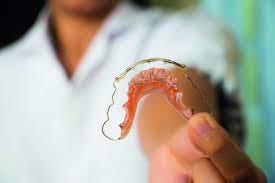What Foods Should You Avoid When Wearing a Retainer?
If you’re new to orthodontic care, you might be wondering, what foods should you avoid when wearing a retainer? Wearing a retainer is an important step to maintain the results of braces or Invisalign, but eating certain foods while wearing one can damage your device or cause oral health issues. Knowing which foods to avoid helps protect your retainer’s integrity, ensures comfort, and promotes good dental hygiene. This guide will walk you through the key foods to skip and tips to keep your Dental Retainers and teeth in top shape.
Why Avoid Certain Foods When Wearing a Retainer?
Retainers, whether clear plastic or wire-based, can be sensitive to damage from certain types of food. Avoiding these foods is important because:
Prevent damage: Hard, sticky, or chewy foods can crack, bend, or dislodge your retainer.
Maintain hygiene: Sugary or sticky foods can cause plaque buildup around retainers, increasing the risk of cavities and gum problems.
Enhance comfort: Some foods may get trapped in your retainer and cause irritation or bad breath.
Prolong retainer life: Proper diet reduces wear and tear, saving you from costly repairs or replacements.
Avoid discoloration: Certain foods and drinks can stain clear plastic retainers, affecting their appearance.
Being mindful about your diet helps keep your retainer functional and your mouth healthy.
Foods to Avoid When Wearing a Retainer:
Here are the main categories of foods you should steer clear of to protect your retainer:
Sticky and chewy foods:
Caramel
Chewing gum
Taffy
Gummy candies
Hard foods:
Nuts
Hard candies
Ice cubes
Raw carrots or tough vegetables (unless cut into small pieces)
Sugary snacks and drinks:
Soda and sugary soft drinks
Sweetened juices
Candy bars
Foods that stain:
Coffee and tea
Red wine
Berries (blueberries, blackberries)
Tomato sauce and curry
Crunchy snacks:
Popcorn
Chips
Pretzels
Avoiding these foods while wearing your retainer reduces the risk of damage and oral health complications.
Best Practices for Eating With a Retainer:
To protect your retainer and keep your smile healthy, consider the following tips when eating:
Remove your retainer before eating or drinking: This prevents food particles from getting trapped and reduces damage risk.
Brush and floss after meals: Cleaning your teeth before putting your retainer back on helps prevent decay and bad breath.
Drink water: Rinse your mouth and retainer to wash away food debris and sugars.
Cut hard or crunchy foods into small pieces: This reduces the strain on your retainer and lowers injury risk.
Avoid eating on the go: Eating mindfully reduces accidental damage or choking hazards with retainers.
Use a retainer case: Always store your retainer safely when removed during meals to avoid loss or damage.
These habits keep both your retainer and teeth in optimal condition.
How Eating Habits Affect Retainer Care and Oral Health?
Your diet and eating behaviors directly influence how well your Dental Retainers Treatment performs and your oral hygiene:
Plaque buildup: Sugary and sticky foods promote bacterial growth around the retainer and teeth.
Bad breath: Food trapped in retainers can cause odor and discomfort.
Staining: Colored foods and drinks can discolor clear plastic retainers, making them noticeable.
Damage: Crunchy or hard foods can cause cracks or bends in retainers, reducing their effectiveness.
Discomfort: Eating with a retainer in place can cause irritation or soreness if food gets stuck.
Adopting healthy eating habits improves your retainer experience and oral health.
When to Consult Your Orthodontist About Retainer Problems?
If you experience any of the following, contact your orthodontist promptly:
Retainer feels uncomfortable or loose after eating
Visible cracks, bends, or breaks in the retainer
Persistent bad breath or mouth sores
Difficulty cleaning the retainer properly
Stains that don’t come off with cleaning
Early professional intervention can prevent further damage and ensure your retainer continues to work effectively.
In summary, knowing what foods should you avoid when wearing a retainer is crucial for maintaining your orthodontic investment. Avoid sticky, hard, sugary, and staining foods, and practice good eating and hygiene habits to protect your retainer and your smile. Regular care and timely orthodontic visits will help you enjoy a healthy, beautiful smile for years to come.


